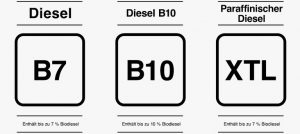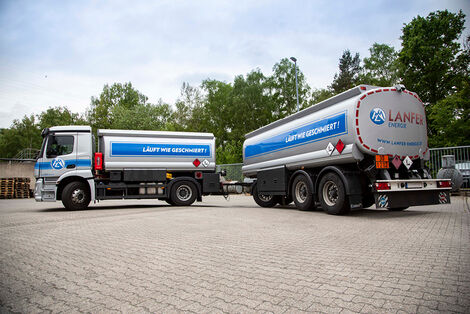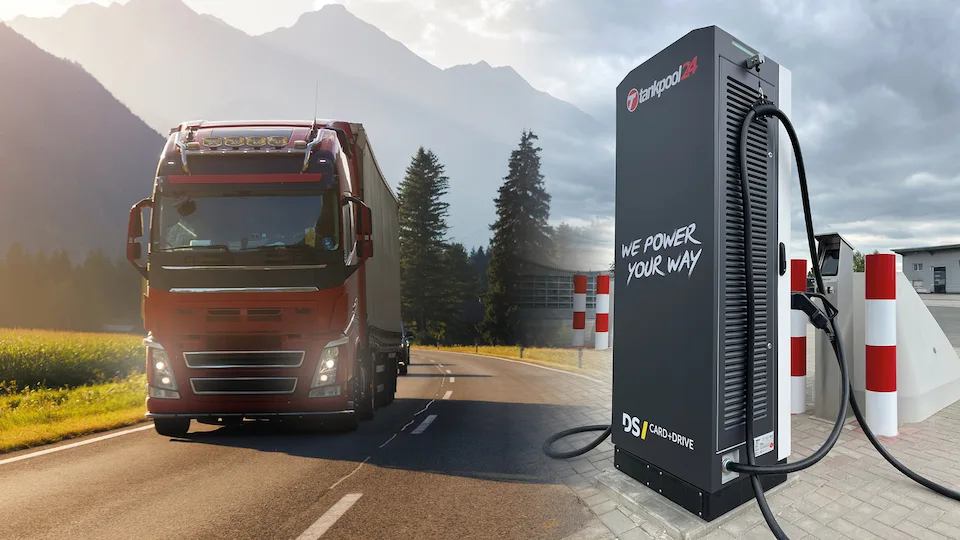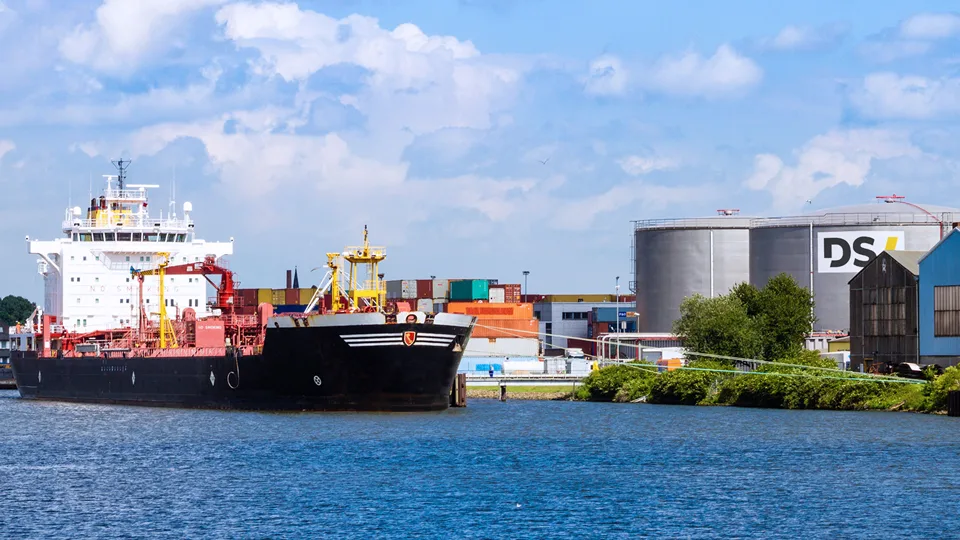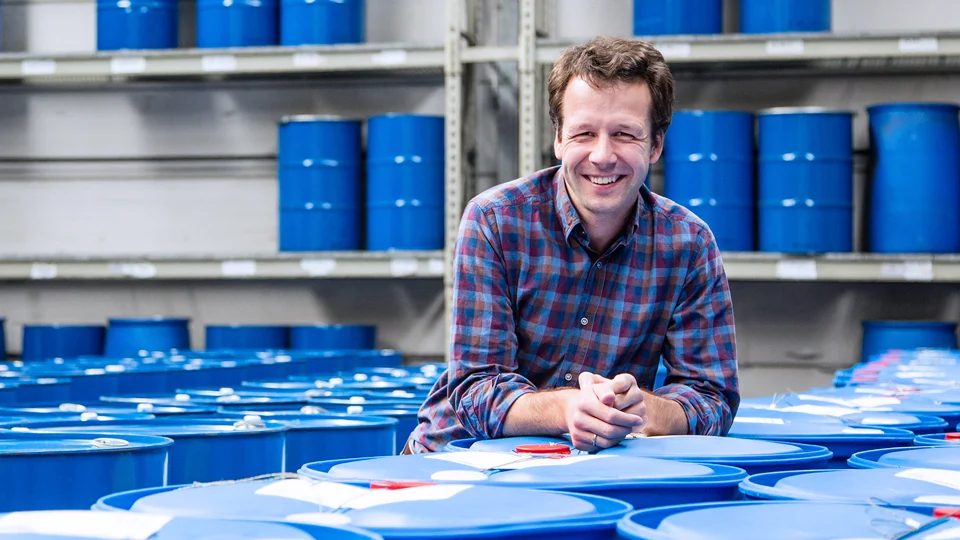The fuel HVO, derived from plant and animal waste, is gaining increasing importance for the decarbonization of the transport sector. With the recently passed legal changes for paraffinic diesel fuels new possibilities are opening up for the DS Group: We can now offer our customers the up to 90% CO2-neutral fuel at our filling stations in the future and already at our warehouse in Bremen.
In the following article, we provide information about the production, advantages, and sustainability aspects of HVO. Additionally, our managing directors from the energy sector provide insights into the planned conversion of filling stations and vehicle fleets in the DS Group, as well as forward-looking strategies for climate-neutral coverage of energy needs in the transport sector.
What is HVO?
HVO stands for “Hydrotreated Vegetable Oil”. It is a renewable diesel fuel (also known as biofuel) produced by hydrogenating vegetable oils or animal fats. During hydrogenation, these raw materials are treated under high pressure and in the presence of hydrogen to alter their chemical structure. HVO can be used as an alternative or supplementary fuel source for diesel in combustion engines. It has similar properties to fossil diesel but is more environmentally friendly as it is nearly free of sulfur and aromatics and reduces pollutant emissions.
What Designations are Used?
The following terms are used for the various types of fuel:
- Paraffinic diesel fuels (XTL: X to Liquid) can be produced synthetically (e.g., from natural gas / Gas to Liquid), from electricity (PtL: Power to Liquid), or from biogenic sources such as hydrogenated vegetable oils, including HVO100
- B10 Diesel has a 10% blend of biodiesel (manufacturer approval required)
- B7 Diesel has a 7% blend of biodiesel
New Legal Situation since April 2024
To reduce the consumption of fossil fuels, the German government is introducing new diesel fuels. For the first time, XTL (fossil-free or paraffinic diesel fuel) is approved for road traffic as a pure fuel. Previously, these fossil diesels could only be blended. The change also includes fuels made from 100% hydrogenated vegetable oils. These legal changes are intended to promote more environmentally friendly and sustainable fuel options in Germany and are expected to come into effect on April 13, 2024. [1]
Manufacturer Approvals
On the website kraftstoffe.info, there is a list of passenger cars and commercial vehicles whose engines have been approved by the manufacturer for the use of HVO100 fuel. Please remember that the warranty becomes void if you use HVO100 without manufacturer approval.
How Sustainable is HVO100?
HVO100 uses biological residues and waste materials, so no agricultural land needs to be directly used for its production. The concern that palm oil is used in the production of HVO100 is unfounded. From 2023, stricter sustainability criteria will apply in Germany, excluding biodiesel from palm oil from the market. [3]
A Closed Loop:
When burning fossil diesel or HVO in the engine, CO2 is produced.
This CO2 is released into the atmosphere.
Plants absorb the CO2 from the atmosphere through photosynthesis.
In the production of HVO, plant waste is used as a raw material, which rebinds the absorbed CO2 and closes the cycle.
How did the topic of HVO come to be addressed in the DS Group?
Christoph Avé-Lallemant (Managing Director DS Energies Holding): Our goal is to supply our customers with all the fuels they need while acting as climate-neutral as possible. That’s why we’ve responded to customer requests and are now preparing various filling stations to offer HVO. This is happening across companies at Lanfer Energie, DS card + drive, EMOVA and Bischoff Vielhauer, as well as in corresponding associations like tankpool24. We see this as an important customer request that we’re happy to fulfill.
Holger Purbs (Authorized Signatory Lanfer Energie): As early as the turn of the year 2022/2023, we had inquiries from larger companies in the transport, agriculture, and shipping sectors that had already dealt with alternative fuels. By now, we receive weekly inquiries from commercial customers and already offer products with pure HVO and blends (R33). The topic is present in the commercial sector, less so in the private sector.
How many filling stations of the DS Group will offer HVO in the future?
Holger Purbs: At Lanfer Energie, we plan to retrofit five filling stations. This requires technical adjustments, as the basic portfolio should be maintained. The project was temporarily put on hold until the law was passed on April 13, 2024. Now we will reassess the situation.
Moritz Schröder (Managing Director DS card + drive): At DS card + drive, the filling stations in Bremerhaven, Industriepark, Arsten, and Stuhr are already prepared for HVO. The first refueling in Wustermark took place on April 18, 2024. Furthermore, we have identified 25 key filling stations that we will retrofit. Often, we have to set up new pumps and tanks because we can’t use the diesel tanks. Some stations are so busy that there would be logistical problems if we reduced the diesel tank space. We plan based on demand and are gradually expanding the network. As part of the tankpool24 network, it’s important for us to motivate our partners to retrofit as well. For comprehensive coverage, we need 80 to 120 filling stations in Germany – anything below that makes it difficult to supply long-distance transport.
Are there plans to switch the company’s own fleet to HVO?
Holger Purbs: Yes, at Lanfer Energie we plan to switch our entire fleet to HVO. This will have a positive impact on our CO2 balance.
Christoph Avé-Lallemant: At EMOVA, we have a large truck fleet that could theoretically be operated with HVO. Here, we will examine whether a switch is economically viable. At DS-Mineralöl, there are also six trucks that could be switched to HVO.
Can HVO cover the energy needs of the transport sector in the future, or will other raw materials and technologies be needed?
Christoph Avé-Lallemant: HVO will not be able to supply the majority of the transport sector. A share of 5-10% HVO would already be significant. This is due to the high fuel demand compared to the limited amount of plant residues available for HVO production. An expansion of production capacities in Germany is necessary, and raw material imports cannot be increased indefinitely as global demand is simultaneously rising.
The great advantage of HVO lies in its flexibility: Cars can be operated with diesel as well as with HVO and eFuels, which makes the topic particularly attractive – and already today. Therefore, it’s important to offer a mix of different fuel options at filling stations. This mix will contribute to making combustion engines increasingly climate-neutral. Given the global energy demand, no single product like hydrogen, electricity, or eFuels will be sufficient in the next 30 to 40 years. We must therefore be open to various energy carriers that can contribute to climate neutrality.
What other advantages does HVO offer?
Holger Purbs: HVO surpasses diesel fuel in its specifications both in cetane number [4] and product purity. Adverse properties of conventional products such as high sulfur content and lack of storage stability are absent. The advantages are therefore obvious. The missing lubricity due to the lack of sulfur is compensated by additives added during storage. At the filling stations, the product is already optimally prepared for use. Furthermore, thanks to its high cold resistance, HVO is suitable for all seasons – quality-stable and excellently storable.
On the Path to Low-Emission Mobility
As the DS Group, we consistently pursue innovative raw materials and technologies to meet the needs of our customers. The introduction of HVO100 marks another step towards more environmentally friendly mobility and emphasizes our commitment to a sustainable future. For more in-depth information about HVO and its application in the DS Group, our expert teams from Lanfer Energie, Bischoff Vielhauer, DS-Mineralöl, EMOVA and DS card + drive are at your disposal.
DS card + drive has already expanded its range of alternative fuels, so that HVO100 is now available at the Wustermark filling station near Berlin (TS 2869). You can find other filling stations where you can refuel with HVO on the following website:
[1] www.bundesregierung.de/breg-de/aktuelles/einfuehrung-neue-dieselsorten-2244528
[2] According to current figures from the Federal Office for Agriculture and Food (BLE), the reduction in CO2 emissions from HVO from waste and residues in 2021 was 89.73 percent, see www.ble.de/SharedDocs/Downloads/DE/Klima-Energie/Nachhaltige-Biomasseherstellung/Evaluationsbericht_2021.pdf
[4] The cetane number is a measure of the ignition willingness of diesel fuels and an indicator of their quality. A higher cetane number improves the ignition capability of the diesel fuel and the starting behavior of the diesel engine, especially at cold temperatures.

